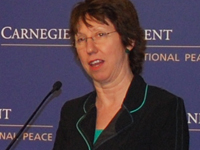Registration
You will receive an email confirming your registration.
As the financial crisis deepens, policymakers are facing growing pressures to close their nation’s borders to the international economy. Catherine Ashton, European Commissioner for Trade, warned that resisting these pressures is imperative, not just for long-term economic health, but for near-term recovery.
Carnegie’s Sandra Polaski moderated the discussion.
Protecting versus Protectionism
Governments have the right and responsibility to protect their people, particularly in times of crisis, by preparing them for future changes in the global economy, according to Commissioner Ashton. Stimulus packages that invest in education and training, enhance the capacity of small businesses to compete globally, and encourage job creation in clean energy industries are examples of proper tools with which a government can protect its people.
However, protectionism – the erection of barriers toward other countries – does not protect a country’s people, she said. Instead, it denies them the benefits of economic openness. Ashton expressed confidence that U.S. leadership appreciates the importance of trade, which generated all of the growth seen in the U.S. economy in 2008, and the critical role that trade must play in a U.S. recovery. The inclusion of a provision that all government procurement must be consistent with international agreements in the recently passed U.S. stimulus package illustrates this understanding.
Global Cooperation on Trade
The EU similarly recognizes the importance of trade, according to the Commissioner, and will work with the United States and their emerging market partners in the G20 to maintain open borders. A resolution of the Doha Development Round would provide the best insurance policy against rising protectionism. A completed deal would strengthen WTO limits on trade barriers, which currently allow so much latitude that even if countries only raise their barriers to WTO bound ceilings, the world would still face significant welfare losses. The Doha Round cannot simply be put on hold until the world recovers from this crisis; it must be part of the solution, she argued.
In addition to recommitting to a conclusion of the Doha Round, Ashton also encouraged G20 leaders at their upcoming summit to reaffirm the moratorium on trade barriers. They should also increase support for the WTO and encourage resumed trade financing, which has been declining since last fall.
Alternatives to Doha
Although some have proposed pursuing single-issue trade agreements as a way to sidestep the complex and slow-moving Doha negotiations, Ashton noted the strategic benefit to having multiple issues on the table: participating parties are more likely to compromise and accept losses in some areas in exchange for benefits in others. Single-issue negotiations tend to pose zero-sum dilemmas, with the losing parties refusing to sign.
Ashton also stressed that greater transatlantic trade, which represents the world’s most significant economic relationship, presents additional opportunities for the US and EU to strengthen their economies. Ashton estimates that enacting consistent rules and regulations would solve 95% of the trade disputes between the two parties. Regulatory consistency will become particularly relevant as both the United States and EU enact new standards for their financial and energy sectors.
Trade with Developing Countries
Developing countries will likely be very hard hit by today’s crisis. Limited government revenues restrict the size of stimulus packages that can be enacted. Declines in foreign aid from developed nations as they divert funds to their own recovery will further hamper the ability of developing countries to recuperate. Ashton suggested that as the G20 leaders work together on issues facing their own economies, they should also cooperate to assist vulnerable developing ones.
